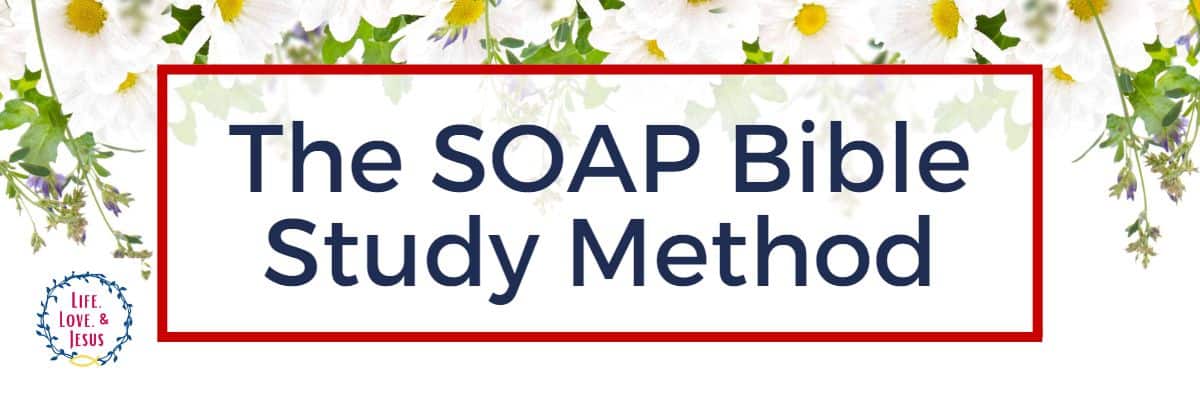Easy to Use SOAP Bible Study Method
This post contains affiliate links. If you click & make a purchase, I receive a commission! Thanks! Read my full disclosure policy. As an Amazon Associate, I earn from qualifying purchases.
The easy to use SOAP Bible study method has been around for a long time. It has staying power because it is easy to use. But it also cna be used to go deeper. It all depends on you, your time, and your interest. The SOAP Bible study method is one of the easiest ways to get started studying God’s Word.
For more information about studying the Bible, you might want to check out posts about the basics of Bible study, free online tools for Bible study, the best tools to buy for studying the Bible, and how to do a basic book study.

I’m not sure who first created the SOAP Bible study method; whoever it was, deserves full credit for an enduringly popular approach to studying Scripture. This method is so popular because it is easy to follow, easy to fit into tight schedules, flexible enough for beginners and advanced students, and includes the life-changing piece of applying the Word to your life.
Each letter in “SOAP” stands for one step of the process: Scripture, Observation, Application, and Prayer.
Scripture
Before you can start, you decide what passage of Scripture you will be studying. You can study one chapter, such as Psalm 51, a section of a book like the Sermon on the Mount in Matthew 5-7, or an entire book like Philippians. The SOAP Bible study method works with any portion of Scripture because you can read as few or as many verses each day as you desire.
If you’re doing a book study, breaking it into paragraphs for your daily sections makes the book manageable. Most Bibles have paragraph divisions that you can use. For example, in my Bible, the book of Philippians has four chapters, but thirteen paragraphs. Studying one paragraph every day, the book could be finished in less than two weeks.
How to Choose a Scripture Passage for Study
Here are some other suggestions for choosing a Scripture passage to study:
- Study ahead to what your pastor will be preaching in the coming week
- Review by studying what your pastor preached in the past week.
- Choose one psalm to study every day until you’ve finished the entire book.
- Study one paragraph section of Psalm 119 every day.
- Follow the paragraph divisions in your Bible and study Jesus’ ministry by using SOAP with just the teaching passages.
- Study a minor prophet and then alternate with a short epistle.
There are plenty of other ways to choose a passage. Whatever you choose, be consistent and follow through. If you decide to study Jonah, don’t stop after chapter 2. If you decide to study through all the psalms, take a break if you want (there are a lot of them!) but always come back.
What you don’t want to do is skip around and never finish anything. Reading one chapter of Genesis today, then a chapter of Galatians tomorrow, and the next a chapter in Proverbs will leave you frustrated and with a spotty knowledge of Scripture.
Read and Summarize the Scripture Passage
Once you’ve chosen your passage, you must read it. If possible, read the passage several times in several different versions. You don’t have to own lots of Bibles to do that – just use any of several different Bible study websites such as biblegateway.com, blueletterbible.org, or biblestudytools.com. For more about online Bible study tools, check out online Bible resources.
After reading the passage several times, choose one to three verses that are particularly meaningful to you and write them out long-hand (no typing!). The act of writing wires directly into your brain, making the verses easier to remember. There is something special about writing verses out by hand, so unless a physical handicap such as severe arthritis or a broken wrist prevents you, write the verse or verses you choose out by hand.
After writing out the chosen verses, write a paraphrase. That is, write out how you would say the verse to someone without changing the meaning but making it more understandable. Rewriting the verse in your own words is an effective way to make sure you really understand what the verse is saying.
Observation
The second step of the SOAP Bible study method is observation. This critical step focuses on seeing clearly what the passage says. No interpretation. No ‘what does this mean?’ No ‘what does this mean to me?’ Just observe and record what you observe.
As you’re writing your observations, you may want to reread your passage a few times. As you observe what the passage says, ask yourself these questions to guide your study. Just remember, only record what the passage says, not anything about applying it to your life but also not recording anything you know from other passages. Just focus on what you are reading.
- Who wrote this passage?
- To whom is this passage written?
- What is the message of these verses?
- What words or phrases stand out to me?
- Do these verses remind me of any other verses or passages of Scripture?
- Was this written before or after Jesus lived? Before or after the resurrection?
Write out all your observations, just as you wrote the verses. Remember, this list contains suggestions. You may find some questions don’t apply or that other questions are needed. Ask and answer any questions that occur to you.
Application
After observing what the passage says, now you must answer the question, “What is the Holy Spirit saying to me through this passage?” Think about your words, your behavior, your relationships, your job, and your family. Nothing should be off-limits to the Holy Spirit.
Ask yourself, “How should my life change because of what I’ve read and learned today?” You may also want to ask yourself specific questions. For example, if you’ve studied Psalm 51, you may want to ask yourself, “Are there any hidden sins in my life that I need to repent of and confess?” Then ask the Lord to show you those hidden sins.
Asking specific questions may help you think of possible actions the Lord may want you to take. Ask yourself questions about sin, obedience, attitudes, character traits, and promises of God. Although it may be tempting to come up with several applications, try to focus on just one or two. Just like with the other steps, write down your application.
Prayer
I assume you started with prayer, but if not let me state clearly here, that prayer should be the bookends of your study.
Begin by asking the Lord for His wisdom, understanding, and a heart to learn. End by turning your application into prayer. Pray the verses you’ve studied back to the Father and thank the Lord for speaking to you through His Word. You may want to also spend time praying for any specific needs of family and friends.
Example
Using Psalm 19 as our text, I’ll walk you through an example of what you might write as you go through the SOAP Bible Study method.
Scripture
- Verse 14: Let the words of my mouth and the meditation of my heart be acceptable in Your sight, O LORD, my Rock and my Redeemer.
- Verse 14 paraphrase: O LORD, You are my Rock and my Redeemer. Help me to always say and think things that will honor and please you.
Observation
- The psalmist, David, wrote this as a hymn of praise to God.
- In verse 14, he is praying to the LORD, asking that he would always make choices with his mind, heart, and tongue that are pleasing to the LORD.
Application
- I know that if I think about the Word and speak about Jesus, my words and thoughts will be acceptable. But I cannot do that all day.
- I will need to be more conscious of what I am thinking, and what I am saying.
- Specifically, when gossiping starts at work, I will walk away or speak up – speaking up is preferable, but not always possible.
- Also, I will post verses in my cubicle so that I have uplifting and God-honoring thoughts to think of while I’m working.
Prayer
- Lord Jesus, help me to fill my mind with Your Word so that what comes out of my mouth will be God-pleasing words. Give me the courage to speak up for those being spoken against when gossiping starts at work.
That’s it!
The SOAP method is short and sweet, and easy to accomplish in a limited amount of time. But it is not shallow. As you spend time reading the Word, thinking about what it says, and applying it to your life, the Holy Spirit will be doing good work in your life.







2 Comments
Comments are closed.